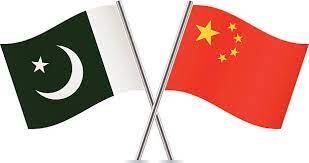
It seems that China Pakistan Economic Corridor (CPEC) Phase-II is getting momentum in the country spreading hopes of economic revival, stability and sustainability. CPEC Phase-II stands for massive industrialization, immense social development, building of special economic zones, agriculture cooperation and last but not least digitalization consolidating the spirits of modernization, openness, artificial intelligence and connectivity in the country gearing towards economic happiness, community development, eradication of poverty and last but not least, generation of new jobs.
To streamline the pace of the CPEC Phase-II the 4th meeting of CPEC Joint Working Group on International Cooperation and Coordination (JWG-ICC) was held in Islamabad. The meeting was co-chaired by Foreign Secretary Muhammad Syrus Sajjad Qazi and Vice Minister for Foreign Affairs of China, Sun Weidong. It vividly reflects the commitment of both countries to accelerate international cooperation and coordination including on CPEC. The both sides reviewed with satisfaction the progress made since the third meeting of the Joint Working Group held virtually on 21 July 2022. Thus holding of the 4th meeting of CPEC JWC-ICC shows spirits of positivity, productivity and participation.
The recently held meeting acknowledged CPEC’s leading role in strengthening international and regional connectivity through appreciating the open and inclusive nature of this flagship project. Undoubtedly, Pakistan and China are All-Weather Strategic Cooperative Partners and iron brothers which reiterated the importance of CPEC in promoting win-win cooperation and sustainable development. It emphasized on welcoming interested third parties to explore mutually beneficial avenues of cooperation.
Moreover, both sides recognized the evolution of CPEC, the two countries agreed to enhance focus on high quality advancements in industry, agriculture, information technology, and science and technology. It meeting ensured tangible socio-economic benefits for the people. The participant rejected the disinformation campaigns and distorted reporting on CPEC and emphasized the need to counter fallacious narratives and misinformation. Thus institutionalization of qualitative development, digitalization, artificial intelligence, modern/hybrid agriculture and technology cooperation and last but not least, green transformation under the flagship project CPEC in the country. Even human capital development must be part of CPEC Phase-II.
They recalled the deliberations of the Second and the Third Pakistan-China Think Tanks Forum in September 2022 and July 2023 the two sides expressed joint support for media and think tanks cooperation which is good omen for mitigating the false and fake propaganda against the CPEC and its utility in the country.
They also agreed on sharing of best practices and generating an intellectual knowledge pool of CPEC and BRI development through enhanced international communication and cooperation. In this regard, formation of Corridor of Knowledge comprising of genuine scholars of China, CPEC, BRI, international media, international marketing, advertising, branding and last but not least soft image should be the way forward.
Recognizing the evolution of CPEC, the two sides agreed to enhance focus on high-quality advancements in industry, agriculture, information technology, and science and technology, and ensure tangible socio-economic benefits for the people. They rejected the disinformation campaigns and distorted reporting on CPEC and stressed the need to counter fallacious narratives and misinformation.
While visiting Pakistan the visiting China’s Vice Foreign Minister Sun Weidong met with President Arif Alvi, caretaker Prime Minister Anwaarul Haq Kakar, caretaker Foreign Minister Jalil Abbas Jilani and Chief of the Army Staff (COAS) Gen Syed Asim Munir and showed great resolve to further strengthening of bilateral relations in terms of socio-economic development, industrialization, green energy cooperation and modernization in the next phase of CPEC.
President Alvi, in his meeting with Mr Weidong, said Pakistan was fully committed to the high-quality development of CPEC, pointing out that the Chinese support in the next phase of the corridor project would be “essential for Pakistan’s industrial development”. He also appreciated the Chinese help in stabilising Pakistan’s economy. Thus main focus of his meeting was to achieve the desired goal of industrial development, and stabilization of Pakistan’s macro-economy which is good omen for the country, its industries and its people at large.
In a separate meeting, caretaker PM Kakar told the Chinese vice foreign minister that Pakistan was fully committed to CPEC’s success and highlighted the need for both sides to ensure timely completion of the ongoing projects.
He earlier welcomed the vice foreign minister as well as members of his delegation and said Pakistan deeply valued its all-weather, strategic and cooperative partnership with China. So, timely completion of the ongoing projects of CPEC is must for economic recovery and stability.
Meanwhile, caretaker Foreign Minister Jalil Abbas Jilani and the vice foreign minister of China reaffirmed the all-weather strategic cooperative partnership and held an in-depth discussion on the entire gamut of bilateral relations, including CPEC as well as economic and financial cooperation.
FM Jilani appreciated the contributions of the vice foreign minister to strengthening Pakistan-China friendship and commended China’s unflinching support for Pakistan on all issues.
Mr Weidong also met Chief of the Army Staff Gen Syed Asim Munir and conveyed China’s satisfaction over security arrangements for the CPEC projects.
According to the Inter-Services Public Relations, matters of mutual interest and measures to further enhance bilateral defence cooperation were discussed during the meeting.
In summary, the visit of China’s Vice Foreign Minister Sun Weidong to Pakistan is timely and productive. The meetings with numerous high officials and important stakeholders vividly reflect strategic importance of Pak-China bilateral relations and CPEC Phase-II in the country.
The rapidly regional socio-economic, geopolitical and geostrategic trends and looming threats of non-state actors clearly focusing further strengthening of bilateral relations between two sides which would foster trans-regional connectivity, massive industrialization, modernization, green energies cooperation, hybrid agriculture, capacity building mechanism and building of real and effective special economic zones under the flagship project of CPEC.
There is an urgent need to remove all bureaucratic hurdles for early approval, disbursement, sanction, execution, implementation and completion of the CPEC projects in the country. In this regard, newly formed SIFC would be used as the biggest platform for development, investments, nurturing of human capital, capacity building system, and last but not least participation of local businessmen, industries and talents in the ongoing projects of CPEC in the country.
The chronic issues of 3S i.e. safety, security of the Chinese people working in different ongoing projects and systematic advancement of the CPEC projects must be addressed as soon as possible. It would encourage further inflows of FDIs from China.
Moreover, there is an urgent need to rectify the 2Ds i.e. deferred/pending dues of the private companies of China accelerating pace and productive of the CPEC projects and clearance/approval of deferred projects.
Change of energy mix shifting from coal to green, building of solar parks/manufacturing factories, hydrogen power generating mini units at appropriate places, formation of EVs units, building of lithium, sand, nuclear and quantum batteries, hybrid agriculture cooperation through converting barren lands into green fields, qualitative industries comprising of digitalization, AI, modern science/space technologies and readjustments of trading preferences should be the way forwards to achieve the desired goals of socio-economic prosperity under the flagship project of CPEC in the country.
(Writer is a Executive Director at The Center for South & International Studies (CSAIS) Islamabad & Regional Expert on China, CPEC & BRI)








